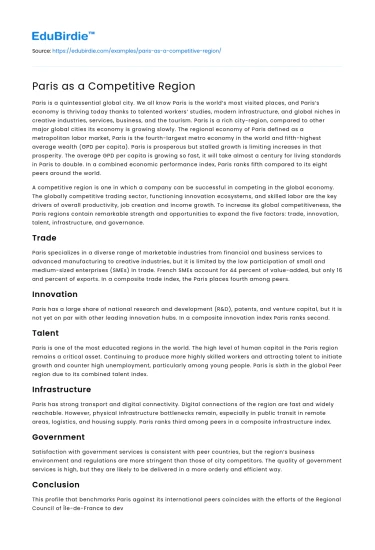Paris is a quintessential global city. We all know Paris is the world’s most visited places, and Paris’s economy is thriving today thanks to talented workers’ studies, modern infrastructure, and global niches in creative industries, services, business, and the tourism. Paris is a rich city-region, compared to other major global cities its economy is growing slowly. The regional economy of Paris defined as a metropolitan labor market, Paris is the fourth-largest metro economy in the world and fifth-highest average wealth (GPD per capita). Paris is prosperous but stalled growth is limiting increases in that prosperity. The average GPD per capita is growing so fast, it will take almost a century for living standards in Paris to double. In a combined economic performance index, Paris ranks fifth compared to its eight peers around the world.
A competitive region is one in which a company can be successful in competing in the global economy. The globally competitive trading sector, functioning innovation ecosystems, and skilled labor are the key drivers of overall productivity, job creation and income growth. To increase its global competitiveness, the Paris regions contain remarkable strength and opportunities to expand the five factors: trade, innovation, talent, infrastructure, and governance.
Save your time!
We can take care of your essay
- Proper editing and formatting
- Free revision, title page, and bibliography
- Flexible prices and money-back guarantee
Trade
Paris specializes in a diverse range of marketable industries from financial and business services to advanced manufacturing to creative industries, but it is limited by the low participation of small and medium-sized enterprises (SMEs) in trade. French SMEs account for 44 percent of value-added, but only 16 and percent of exports. In a composite trade index, the Paris places fourth among peers.
Innovation
Paris has a large share of national research and development (R&D), patents, and venture capital, but it is not yet on par with other leading innovation hubs. In a composite innovation index Paris ranks second.
Talent
Paris is one of the most educated regions in the world. The high level of human capital in the Paris region remains a critical asset. Continuing to produce more highly skilled workers and attracting talent to initiate growth and counter high unemployment, particularly among young people. Paris is sixth in the global Peer region due to its combined talent index.
Infrastructure
Paris has strong transport and digital connectivity. Digital connections of the region are fast and widely reachable. However, physical infrastructure bottlenecks remain, especially in public transit in remote areas, logistics, and housing supply. Paris ranks third among peers in a composite infrastructure index.
Government
Satisfaction with government services is consistent with peer countries, but the region’s business environment and regulations are more stringent than those of city competitors. The quality of government services is high, but they are likely to be delivered in a more orderly and efficient way.
Conclusion
This profile that benchmarks Paris against its international peers coincides with the efforts of the Regional Council of Île-de-France to develop a new economic strategy to help stabilize the main economic strengths of the Paris region and address the remaining challenges. The Paris region is well positioned to act on these findings, and the region is recommended to pursue its approach using the international lens deployed in this report. Such an approach would recognize that the marketable industries of the Paris region, which participate in the global market for trade and talent, were the main drivers of Paris’ growth. And with its comparative advantage of living in the technology-intensive part of the economy, Paris should focus specifically on supporting its regional innovation system and preparing workers to participate in these expanding sectors. Investments and reforms in the region’s infrastructure and management, respectively, can also help enable the region’s competitiveness. By taking purposeful action today, the public, private, and civic institutions of the Paris region will build a global competitive economy that works for everyone.






 Stuck on your essay?
Stuck on your essay?

